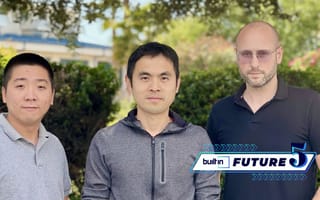
Sure the latest initiatives from the Teslas, Apples and Googles of the industry tend to dominate the tech news space — and with good reason. Still, the tech titans aren’t the only ones bringing innovation to the sector.
In an effort to highlight up-and-coming startups, Built In launched The Future 5 across 11 major U.S. tech hubs. Each quarter, we will feature five tech startups, nonprofits or entrepreneurs in each of these hubs who just might be working on the next big thing. You can check out last quarter’s San Francisco round-up here.
***
Breaking down lithium batteries once electric vehicles (EVs) are done using them isn’t easy. Typically, the process is done by hand and can be laborious and even dangerous, exposing workers to hazardous materials. However, the sustainability prospects of reusing EV batteries, as well as the thousands of dollars worth of precious metals inside them, makes it a worthy, if time consuming, endeavor.
One company is rethinking how lithium batteries are taken apart to make the process safer and more efficient. Posh, which recently raised its first seed round of $3.8 million, combines computer vision and robotic arms to automate battery dismantling processes. Its flexible automation systems can disassemble numerous types of battery packs and use them to make new battery packs at scale, powering a more sustainable future for robotics and EVs.
We want to bring affordable lithium-ion batteries to the masses and help create a circular economy for our electric future.”
Wesley Zheng, the company’s co-founder and CEO, started the company after completing his Ph.D. on lithium batteries at Stanford University. After realizing the sheer number of EV batteries piling up at warehouses while they waited to be dismantled, he knew there was a better way. Wesley said one of the most difficult parts of dismantling end-of-life-cycle and recalled EVs is dealing with abnormalities and uncertainties, so Posh developed a flexible automation system that could handle large varieties of batteries.
“There will be around 12 million tons of batteries retiring from EV between now and 2030,” Zheng said in a statement. “Today these retired batteries are disassembled almost 100 percent manually before they are reused or shredded for recycling. We are changing this by making battery disassembly fast, safe and scalable. We want to bring affordable lithium-ion batteries to the masses and help create a circular economy for our electric future.”




